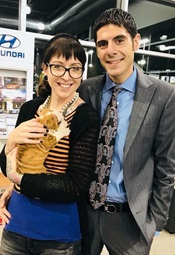Alumni Spotlight: Natt Fiumara
September 28, 2020
 After 18 years in the business world, Natt Fiumara knew he wanted to lean in toward a significant shift, one that would allow him to help people with addictions. Having managed a substance-use disorder, Fiumara was able to see first-hand the immediate need for counselors that were specialists in addictions, competent and empathetic. Searching for programs that might fit his new career direction, he discovered the online Master of Science in Addictions Counseling at CNHP, and decided that this was the right fit. During the program, Fiumara was motivated by the evidence-based curriculum, focused on actionable treatment and innovative approaches.
After 18 years in the business world, Natt Fiumara knew he wanted to lean in toward a significant shift, one that would allow him to help people with addictions. Having managed a substance-use disorder, Fiumara was able to see first-hand the immediate need for counselors that were specialists in addictions, competent and empathetic. Searching for programs that might fit his new career direction, he discovered the online Master of Science in Addictions Counseling at CNHP, and decided that this was the right fit. During the program, Fiumara was motivated by the evidence-based curriculum, focused on actionable treatment and innovative approaches.
Inspired by the faculty, particularly, Abby Dougherty, PhD, and Holly Sawyer, PhD, Fiumara took courses that included Trauma and Families, Treatment Planning and Relapse Prevention, and Research Methods in Behavioral Sciences. Faculty shared candid feedback and were transparent about the challenges and expectations in the profession. Case studies and course work dealt with real examples, allowing the students to engage content that would directly relate to their future practice and prepare them for the important work ahead.
During the program, Fiumara engaged with his classmates, who all shared an intentional focus on helping those with addictions. The class was taught exclusively online, and Fiumara and his classmates connected over life experiences and weekly discussions. A professional and supportive environment allowed students to thrive in their pursuit of their educational goals.

There is great need for addictions counselors, as Fiumara immediately discovered in his job search. His last day of class coincided with his first day of work in his new role as a counselor at a methadone clinic in Baltimore. In a city hit hard by the opioid epidemic, Fiumara devotes extraordinary time and energy to connect with his patients, help them unpack their trauma, and build trust with each person. The opioid epidemic has had devastating consequences in the United States. According to the Department of Health and Human Services in 2018, 10.3 million people in the U.S. misused prescription opioids, 808,000 people used heroin, and around 130 people died a day because of opioid-related drug overdoses. These are not just painful numbers; these are real people that Fiumara works with every day. Their stories are more than statistics, and Fiumara is focused on seeing what is right in each situation, rather than only what is wrong.